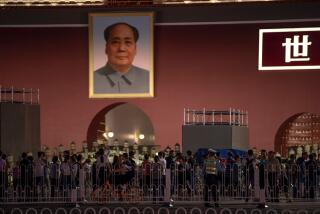Beijing bombing suspect: Years of grievances over harsh treatment
BEIJING -- His given name, which means “China star,” signifies a lofty ambition. But reality was apparently much more harsh for Ji Zhongxing.
Before the 33-year-old allegedly set off explosives from his wheelchair on Saturday evening at Beijing’s airport, Ji seems to have been a lowly former motorcycle taxi driver with a primary school education trying to support his family.
One day, eight years ago -- according to a missive posted online in 2006 and attributed to him -- he had a run-in with low-level public security officers in the southern province of Guangdong that changed his life forever (link in Chinese).
“On June 28th, 2005, I rode a motorcycle to drop off a passenger .… Public security tried to stop me, but I didn’t stop because I didn’t violate any rules and the road was too narrow to park,” the online posting attributed to Ji said. “Suddenly … seven to eight public security officers holding steel pipes stopped me. One of them hit me right in my face with the steel pipe.”
“By the time I woke up, it was already the next afternoon. The passenger I drove told me the defendants continued to attack me with steel pipes till I was unconscious. They sent me to the hospital and ran away. We couldn’t do anything .... My family is in debt to treat me and I’m paralyzed.”
“Because we are peasants and we are poor, no one is willing to help us,” the author wrote in the entry, which was the latest one in the blog.
It was impossible to immediately verify the authenticity of the online posting. But the author’s name, age and hometown matched that of the description of the suspect in the explosion given by state-run media.
The official Xinhua news agency and state-run broadcaster CCTV reported that shortly before 6:30 p.m. Saturday, a man identified as Ji Zhongxing had been attempting to hand out leaflets detailing his grievances at Beijing International Airport’s Terminal 3 (link in Chinese).
Xinhua said Ji had been protesting “more than 10 years over alleged unjust treatment which resulted in his paralysis.”
After authorities tried to block the man from doing so, he set off a homemade explosive device, injuring himself and filling the surrounding area with smoke, state-run media and witnesses reported. Xinhua described the device as being “like fireworks” and said Ji was “under treatment.”
[Updated at 6:15 p.m. PDT, July 20: Ji was treated for wounds to his arm. His injuries were said not to be life-threatening.]
No one else was injured, and Xinhua said the incident did not disrupt flight schedules at the airport, one of the world’s busiest. Several witness accounts say Ji tried to warn others away from him before setting off the blast.
Pictures posted on Chinese microblogs captured the blast itself, the smoky aftermath and scenes of medical personnel rushing to attend to a man who had fallen out of his wheelchair.
One witness, who gave only his family name, Qing, told the Associated Press that there was no one around the man when he set off the explosive.
“It sounded like the sound of big firecrackers,” said Qing, who was about 70 yards away from the explosion. “There was a lot of smoke and the police arrived very fast.”
The airport blast comes on the heels of another incident involving complaints against low-level public security or urban management officers, known as chengguan in many parts of the country but also called zhian duiyuan in some places including Guangdong.
On Wednesday, a watermelon peddler died after a confrontation involving such security personnel in Hunan province, in south-central China.
Witnesses said the chengguan beat the peddler, but authorities said the peddler dropped dead after an argument with officers. Outrage over the man’s death has spread through social media. Amateur political cartoonists have been posting biting commentaries in picture form about the incident.
On Saturday, local authorities in Hunan province reported that the family of the man, Deng Zhengjia, had received $146,208 in compensation and that two senior chengguan supervisors had been removed from their posts.
Six other chengguan officers have been detained as authorities investigate the death. Forensic samples from Deng’s autopsy have been sent to a lab in Guangdong province for further analysis, authorities said Saturday.
Chengguan officers are a notch below police, holding a rank roughly equivalent to a parking enforcement officer in the United States. They have a reputation for frequently overstepping their authority and roughing up street vendors.
ALSO:
Cambodian opposition leader stirs up election
N. Korea-Cuba drama boils down to useless weapons
Watch: Musical tributes for Nelson Mandela’s 95th birthday
Nicole Liu in the Times’ Beijing bureau contributed to this report.
More to Read
Sign up for Essential California
The most important California stories and recommendations in your inbox every morning.
You may occasionally receive promotional content from the Los Angeles Times.











